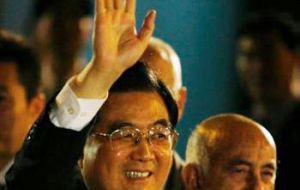MercoPress. South Atlantic News Agency
Chinese president in Cuba on leg of Latam tour
 China's President Hu Jintao on his arrival at the airport in Havana
China's President Hu Jintao on his arrival at the airport in Havana President Hu Jintao began a two-day visit to Cuba by agreeing to increase Chinese purchases of Cuban nickel and sugar, and send farm goods to the communist-run island as it recovers from three devastating storms.
Hu arrived in Cuba late Monday on the second leg of a Latin American tour that comes as China expands its diplomacy and investments in the resource-rich region. Earlier, the Chinese leader announced the start of free trade talks with Costa Rica in January. Even as Cuban state television broadcast images of Hu arriving at Havana's airport, it was already announcing the signing of the trade and investment accords. The governments were expected to sign more economic agreements during his visit. The much-needed investment comes just weeks after Cuba's farm sector and economy was devastated by Hurricanes Gustav, Ike and Paloma, which did more than $10 billion in combined damage. Cuban media did not give a monetary value for the latest agreements. "For half a century, the Cuban people have accomplished great successes in safeguarding state sovereignty, national economic development and a better quality of life," Hu said in a statement. "We sincerely hope that the Cuban people continue to make new advances in building socialism." Hu, who was accompanied by a large delegation of Chinese businessmen, was met at the airport by Vice President Jose Ramon Machado Ventura and a throng of Chinese residents who waved tiny Cuba and Chinese flags. Hu last came to Cuba in 2004, when he met with Fidel Castro. The ailing, 82-year-old has not been seen in public since undergoing emergency intestinal surgery in July 2006 and there was no word on whether China's president would meet with him this time. Hu was expected to see Fidel's younger brother Raul, who took over as Cuba's president in February. The Chinese president was scheduled to visit a Havana school for Chinese students on Tuesday and Cuba's government scheduled an accord-signing ceremony at the Palace of the Revolution in the evening. China has transformed its economy by embracing market reforms, even as its Communist Party has continued to maintain strict control over the political system. Raul Castro is said to be an admirer of the Chinese economic reform model, though top Cuban officials have said they have no interest in implementing such policies in this country. China is Cuba's second-largest trading partner, with the two sides generating $2.7 billion annually. Only Venezuela trades more with Cuba. Cuba-China relations were cool for decades given Havana's close ties to Moscow. The collapse of the Soviet Union crippled Cuba's economy, however, and borrowing and increased trade with China has helped the island recover in recent years. Hu's trip to Costa Rica was his first to Central America. China's trade with Latin America has jumped from $10 billion in 2000 to $102.6 billion last year. (AP)




Top Comments
Disclaimer & comment rulesCommenting for this story is now closed.
If you have a Facebook account, become a fan and comment on our Facebook Page!